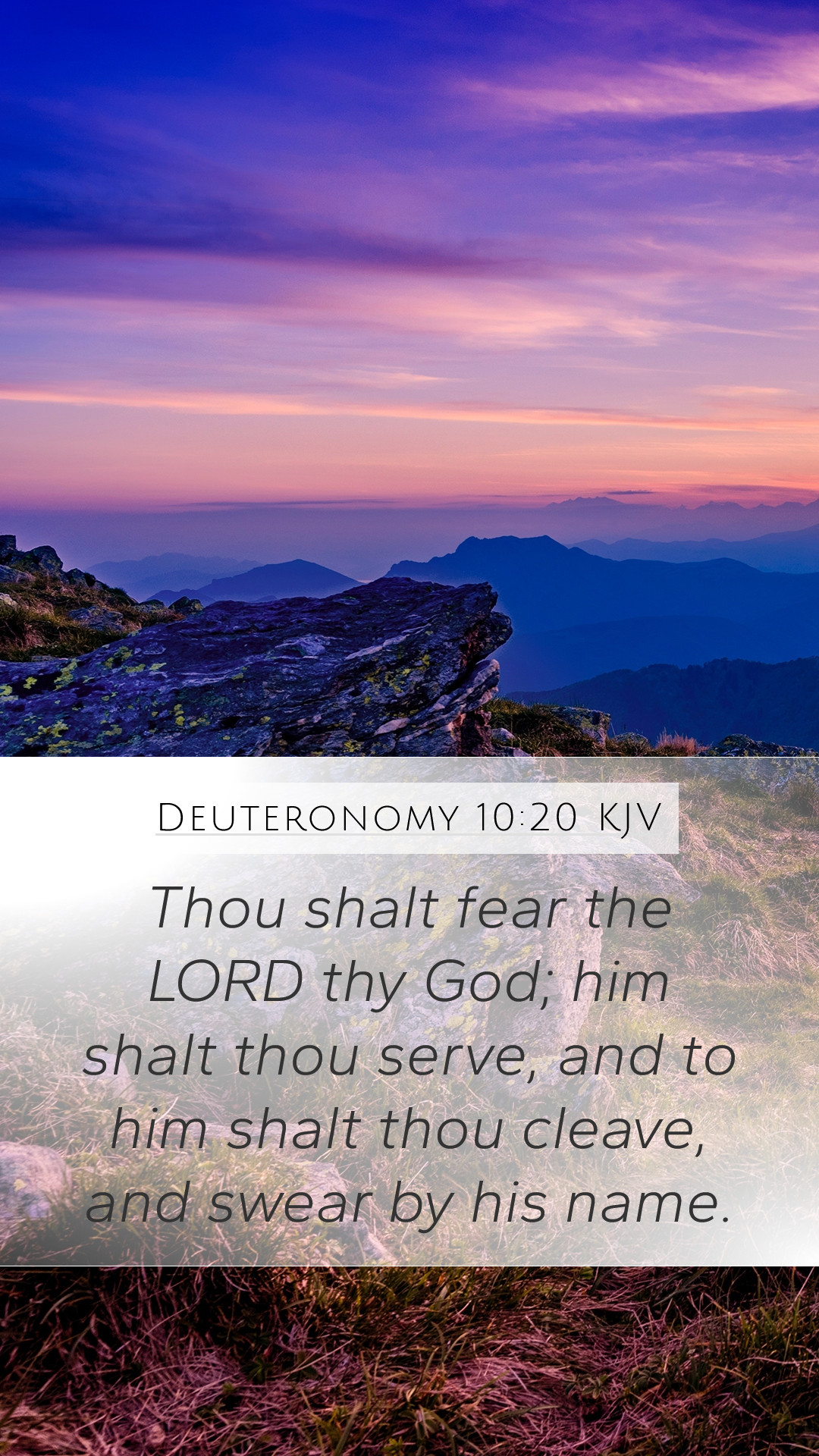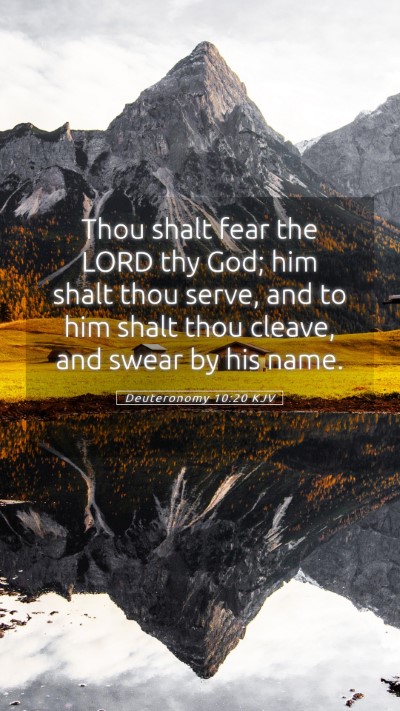Understanding Deuteronomy 10:20
In Deuteronomy 10:20, the verse states: "Thou shalt fear the Lord thy God; him shalt thou serve, and to him shalt thou cleave, and swear by his name." This verse serves as a cornerstone for understanding the relationship between God and His people, highlighting the importance of reverence, service, and allegiance to the Lord.
Bible Verse Meanings
This verse emphasizes three fundamental aspects of a believer's relationship with God:
- Fear of the Lord: This does not imply terror, but a deep, reverential awe towards God. Matthew Henry notes that "the fear of God is the beginning of wisdom," suggesting that this fear is foundational in cultivating a wise and righteous life.
- Service to God: The call to serve the Lord expresses an active commitment to follow His commands and live according to His will. Albert Barnes explains that serving God involves obedience and dedication to His requirements for a faithful life.
- Cleave to God: The instruction to "cleave" signifies a strong attachment and loyalty to God, emphasizing the necessity of being unwavering in one's devotion. Adam Clarke writes that cleaving to God involves a unity that is vital for believers, fostering a relationship marked by trust and reliance.
Bible Verse Interpretations
Interpreting Deuteronomy 10:20 requires an examination of its cultural and historical context. This verse comes from a pivotal moment in Israelite history where Moses is reminding the people of their covenant with God and their identity as His chosen people. It serves as a powerful reminder that their worship must be directed solely towards the Lord.
Albert Barnes also highlights that the act of swearing by His name reinforces the seriousness of commitment. In Biblical times, swearing by the name of God was a declaration of truth and integrity, indicative of a deep relationship with Him.
Bible Verse Explanations
Explaining this verse offers insights into how it applies to modern believers:
- The fear of God calls for a life lived with respect for His authority and a recognition of His holiness.
- Serving God grows out of a relationship built on this fear and trust, leading individuals to engage in acts of kindness and service toward others as a reflection of their devotion to God.
- Cleave to God signifies a commitment that goes beyond mere belief; it is about forging an unbreakable bond with the divine that influences every aspect of one’s life.
Bible Study Insights
For those involved in Bible study groups or engaged in online Bible study, this verse offers rich material for discussion. Explore how the call to fear, serve, and cling to God can be applied in today's context. Many Bible study resources highlight these principles as ways to deepen faith and live out God’s teachings.
Significance of Deuteronomy 10:20
The significance of this verse extends beyond mere commandment; it lays the foundation for a covenant relationship that is characterized by love and loyalty. It acts as a guide for understanding how believers can live lives that honor God. As Adam Clarke notes, this commitment shapes the identity of God's people and underscores the seriousness of their faith.
Applying Deuteronomy 10:20 to Daily Life
Application of this verse can be practically manifested in several ways:
- Establishing a routine of prayer and worship that honors God’s authority.
- Engaging in community service as a tangible expression of serving God through serving others.
- Forming deep connections with fellow believers that foster accountability and spiritual growth, embodying the aspect of cleaving to God and one another.
Historical Context and Cross References
Understanding the historical context of Deuteronomy 10:20 enriches the study. The Israelites were at a crucial juncture, poised to enter the Promised Land, making Moses' words imperative for establishing their future as God’s covenant people. For further exploration, you may consider the following cross-references that align with the themes of worship, service, and commitment:
- Exodus 20:3: "Thou shalt have no other gods before me."
- Joshua 22:5: "But take diligent heed to do the commandment and the law, which Moses the servant of the Lord charged you..." (a reminder of the calling to serve God).
- 1 Samuel 12:24: "Only fear the Lord, and serve him in truth with all your heart..." (similar instructions echoing the call to devotion).
Conclusion
In summary, Deuteronomy 10:20 holds a profound message applicable to both ancient and modern believers. The integration of fear, service, and loyalty encapsulates the essence of what it means to live in covenant with God. As you engage in your own Bible study insights, consider how this verse resonates with your faith journey and the ways it shapes your practice of understanding Scripture.


